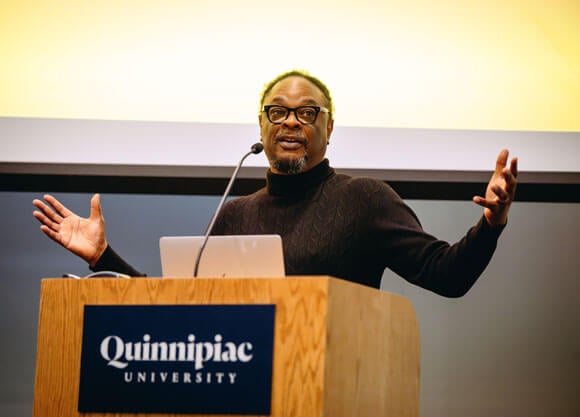
Critical Conversations brings national author, lecturer to address racism on college campuses
February 02, 2024

February 02, 2024

President Judy Olian and Interim Vice President of Inclusive Excellence David Fryson welcomed Ross to the Mount Carmel Campus on February 1 as part of the university’s Critical Conversations Series.
“Our purpose for this series is for us to not be anchored in strictly our own views, but that we be open to listen with respect, with humility, and with real curiosity about hearing one another,” Olian said.
Based on his book, “Blackballed: The Black and White Politics of Race on America’s Campuses,” Ross opened his lecture with an unvarnished delivery of devastating historic and present-day incidents of racism on college campuses.
Ross was inspired to research and write “Blackballed” after hearing from students exposed to racism on college campuses. He said many spontaneously shared their experiences after hearing him lecture on his book, “The Divine Nine: The History of African American Fraternities and Sororities.”
“One of the things that would occur is that students would come up to me and surreptitiously just tell me about their experiences. It was almost like a conspiratorial whisper, where they would talk about issues that they had to deal with,” said Ross.
While researching “Blackballed,” Ross said, “What I recognized is that on every particular campus, including Quinnipiac, there are issues of campus racism.”
Mired in a country which built its society based on white supremacy, racist incidents on American college campuses are often dismissed through a practice Ross termed as “three ‘ize’ equals a miss,” in which they are individualized, minimized, or trivialized. This tendency to characterize white offenders as immature, or their actions as unintentional or an anomaly, perpetuates racism.
Ross challenged the Quinnipiac audience to take action to help undo the perpetuation of racism in their community.
“Any time you have an incident on campus or anywhere around, will you speak up and say something about it? Will you look and find out the roots of why something happened? Or will you just look at it as an aberration?” Ross asked. “Or will you get to the root of it, and make a decision to actually take action?”
Ross shared dozens of jarring examples of national news stories and social media posts evidencing racist incidents on college campuses. Many involved offensive stereotypes and racist codifying enacted by white fraternity and sorority organizations.
Ross said that while, in many cases, universities can’t respond to such fraternity and sorority offenses due to issues of free speech; fraternity and sorority organization leadership can and should do more to address the issues. Ross also pointed to 2015 and 2016 surveys showing persistent college leadership reports of positive campus racial climates, despite glaring issues such as rising student protests and demonstrations due to racist incidents.
To make change, it is necessary to deconstruct the system of inequities, said Ross. He noted that “racists do racist things,” while “non-racists watch racists and do nothing…and then call for incremental change.”
“You have to do something,” Ross told the Quinnipiac community. “You have to take action. A lot of times you have people who are twisting the themes and ideals and principles that we know will make a better America, and are doing it as a way to create an America that we don’t want — which is one that is centered around racism, misogyny, sexism, homophobia, and the like. We have to recognize that and make sure that we fight against it. We have to be proactive, not reactive.”
Ross urged all of Bobcat Nation to demonstrate their support and belief for needed change.
“The dreams only occur when you make it a reality. If not, it’s just words,” said Ross. “Quinnipiac, if you have values here that you believe in, then make sure you believe in them for every particular student. And don’t just do performative, when it comes to the idea of diversity, equity, and inclusion. You have to deconstruct the campus environment; and you have to make sure that white students stand up just as much as Black, Latinx, Asian, and Native American students.”
Quinnipiac Today is your source for what's happening throughout #BobcatNation. Sign up for our weekly email newsletter to be among the first to know about news, events and members of our Bobcat family who are making a positive difference in our world.
Sign Up Now